
|
Recording of this talk: https://youtu.be/gvFy_VFg5dA?t=1606 # |

|
# |
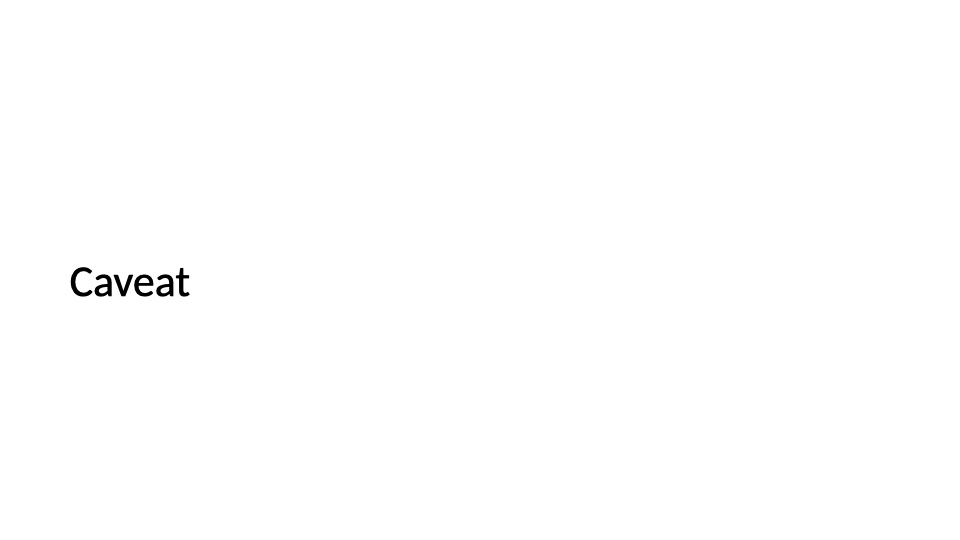
|
The main purpose of this talk is to share how I have come to practice the way I do, through my lay life, including the different challenges I encountered. This is first-and-foremost true for me, but it might or might not be true for you, because everyone's conditioning is different. So, please use your common sense, and apply what makes sense for you. # |
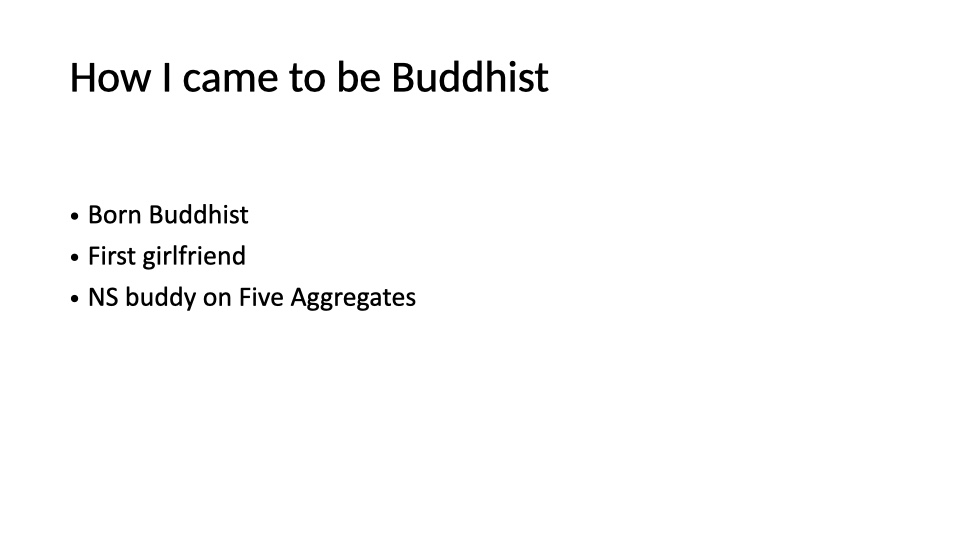
|
I was born a Buddhist, but like many of us, wasn't really practicing. The moment I realised I was *really* a Buddhist was much later in my life, when I was around 19, after I had gone through a phase of discovering the different religions (due to an ex-girlfriend who almost got me to become Christian). I was serving National Service, when I started chatting with my bunkmate/friend Y. Y had been a Buddhist monastic for a period of time, and I told him about the Zen book I read in JC, and how the idea of emptiness made a lot of sense to me, because I was feeling empty after getting dumped by my girlfriend (I couldn't accept Christianity). Y then told me "you're skipping levels, you need to first understand the five aggregates". Huh? What's that? And that's when he described the five aggregates to me: form, feelings ("it's not about emotion but about the sense feeling of good, pleasant and neither"), mental formation, perception, and consciousness. At that moment when he described it, it all made sense to me, and that was when I decided I was Buddhist. # |

|
After that, I tried different things in my early years of the Dharma, especially in university: 1. The first thing I tried was a "Meditation Appreciation course" by Brother Vajiro Richard Chia. My intention was to try it out with my mother: I thought this would help her anxiety. When I finished the course, I was told I had "reached" the third jhana. 2. When I was at Rice University in Houston, I attended university courses on Buddhism (primarily on Tibetan Buddhism), but also made it a point to go to the Chinese Mahayana Jade Buddha Temple. At one point, I took the Three Refuges there, and was given the name of Huixi (慧喜), which translates as "wisdom happiness", which the venerable explained was for me to use my wisdom to bring happiness and joy to others. 3. More importantly, at the university library, I discovered the book "A Still Forest Pool". I vaguely recalled Y talking about a Thai forest monk who "looked like Kermit the Frog", and happened to see this book when I was procrastinating. 4. I even attended my very first meditation retreat: I travelled to Dharamshala, India, to complete a vipassana retreat, with my then-girlfriend. The mistake was choosing to go there during the monsoon: I was expecting very warm weather, but it was around 15 celsius daily, and it rained every day... it was miserably cold. Towards the end, I was able to sit for 1-2 hours each time. # |

|
But even though I had taken the Three Refuges, and was reading about the Dhamma/Dharma, that didn't mean that I was sticking to the five precepts. In practice, I was still not a Buddhist, because I was really not keeping the five precepts, especially the fifth one. I was never an alcoholic, but since young, I was always interested in fine wine and dining: I would save up money to buy bottles of wine... once, I even had a very long pleading argument with my father, when I wanted a wine fridge for my birthday present. To my regret, the only thing I "accomplished" in my university days was to co-found a wine drinking club with a friend! This extended after graduation, to my first few jobs, especially when I was in banking. That was when I really drank a lot. Once, I woke up half naked (I won't say which half!) in a place that I didn't recognise: the first thing I saw was a shovel and a bag of cement. My first action on waking up was to check if my kidneys were still there. To this day, I have zero recollection of what happened. On hindsight, I clearly fell for the marketing around the social prestige of alcohol and work. It seemed the cool thing to do. I joined a European bulge bracket bank in Hong Kong, where I was involved in two IPOs as a junior banker. Remember that this was before the Great Financial Crisis: at that point, investment bankers ruled the world (or so they thought...). After I got laid off, I joined a proprietary day-trading firm in Singapore, which had its own yacht (and later went bankrupt due to algorithmic trading eating into their market). Again, I got laid off: so far I have only met a handful of people who have been laid off twice or more, and I'm one of the lucky ones! # |
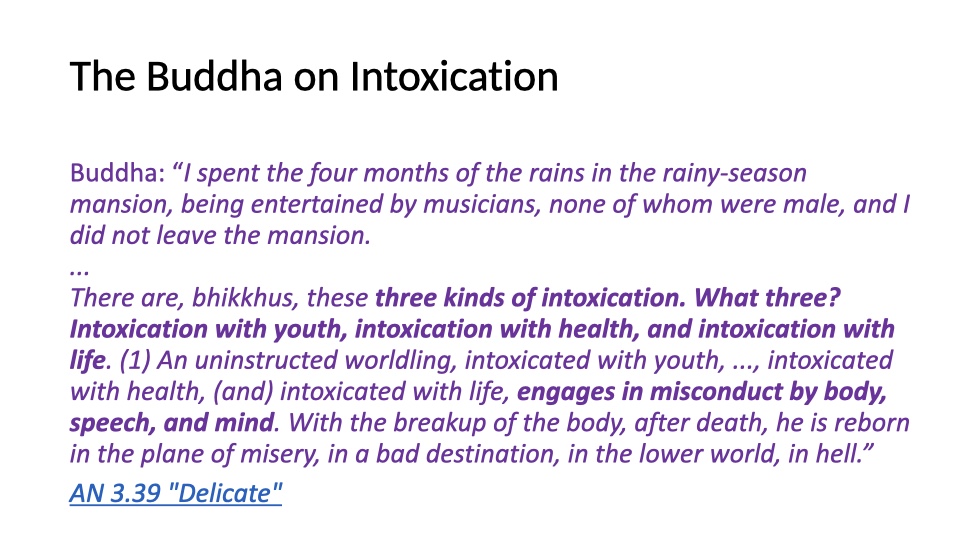
|
To be honest, I spent and craved a lot during that period. It is similar to the Buddha's description of his own life, which described a lot of sensual pleasure. In many ways, the Buddha Siddhartha Gotama was the Original Crazy Rich Asian! AN 3.39 Delicate Sutta: https://suttacentral.net/an3.39/en/bodhi # |

|
My first wake-up call happened when I was in investment banking. I went with a boss on a business trip to Taiwan for a deal. We were chatting, and to my huge surprise, my boss said “I can never travel in an airline less than business-class, or stay in a hotel less than five stars.” That shocked me, so I asked “why?” “Because I am so used to both, that anything less is really uncomfortable: it is horrible!” That made me realise that banking was really Samsara on Steroids. The second wake-up call happened when I was working on a deal. For technical due diligence, we had to work with subject matter experts. In this mining deal which we were pitching, we had to hire a geophysicist, and I called one. He was a senior Australian guy, and he was quite a nice chap: so we ended up having a very nice chat for about half an hour. After that call ended, a boss pulled me aside, and said “hey, PJ , I heard you talking to the technical expert just now. I just want to tell you, you were TOO NICE. Remember, YOU’RE A BANKER. You have to show them who is boss.” Mentally, I thought “to hell with you, I’m going to do what I think is right!” Not very kind, it’s true…. But I thought this passage from the Metta Sutta highlights what was NOT good livelihood when I was in investment banking in 2007-2008: that I was NOT “humble and not conceited, contented & easily satisfied, unburdened with duties & frugal in their ways”. In fact, almost nobody in investment banking was like this: it’s all ego, discontentment & intense fault finding, being “super busy”, and spending money because “you’re a BANKER”. Sutta Nipata 1.8 Metta Sutta: https://suttacentral.net/snp1.8/en/amaravati # |
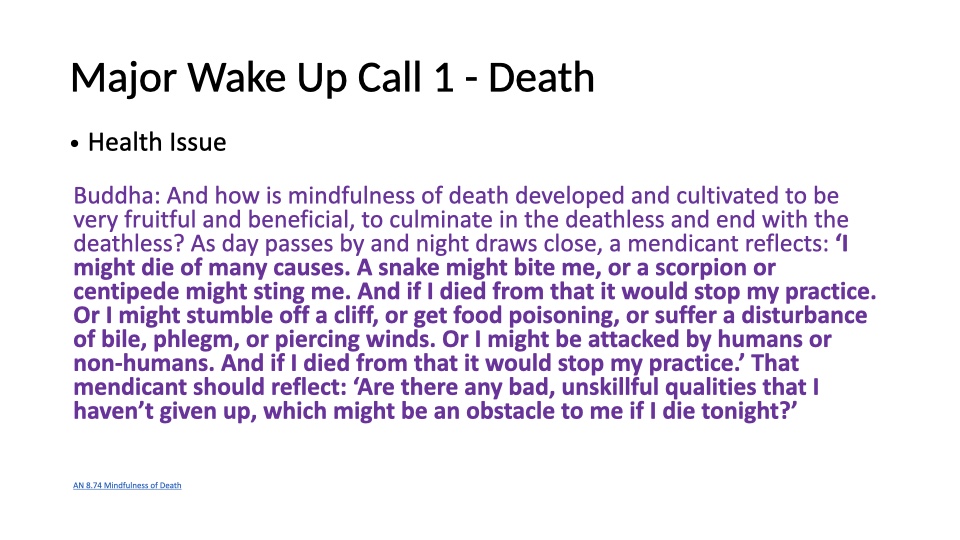
|
The MAJOR Wake Up call happened shortly after I left banking, when my long-time family doctor checked me, and then told me “I think you should see a heart specialist: something sounds not right”. So I went to see a heart specialist, who then recommended me to get a pacemaker, as I had an irregular heartbeat. I asked the doctor, what happens if I decide NOT to put the pacemaker in? “Then you might go to sleep one night ,and never wake up again.” AN 8.74: https://suttacentral.net/an8.74/en/sujato # |

|
That was such a wake-up call. For six months, I woke up every morning, and I was immensely grateful to be alive, every morning. It really drove home the point that our time is limited. AN 8.74: https://suttacentral.net/an8.74/en/sujato # |

|
But the event that left an even deeper impression on me, was the passing away of my uncle, my Ah Gu. He was the first person who I was close to, whom I loved, who passed away. Even though I thought I had practiced vipassana & the Dhamma for years (though not really), my uncle’s death hit me in the gut like a punch & a ton of bricks: I remember crying, sobbing, as though all the air was sucked out of the room. MN 87 https://suttacentral.net/mn87/en/sujato # |
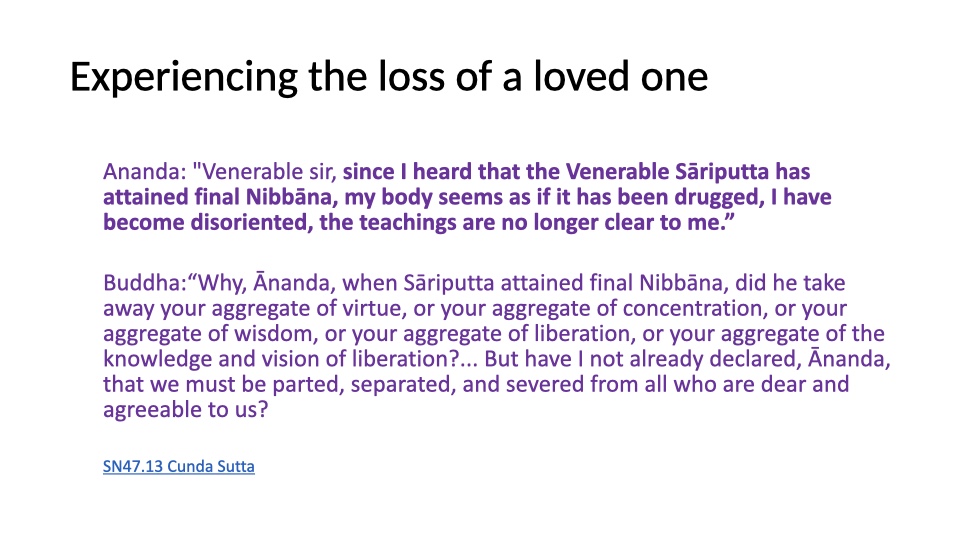
|
… and it felt exactly like Ananda’s description, that the body is drugged, I became disoriented, and the Dhamma was no longer clear to me. And that was one of my first experiences that showed me the profound difference between MERE INTELLECTUAL UNDERSTANDING vs. DIRECT EXPERIENCE & KNOWLEDGE. SN 47.13 https://suttacentral.net/sn47.13/en/bodhi?reference=none&highlight=false # |

|
What did I learn? Samsara has many, many traps, and often you think you know what you should aim for. But many of those things actually generate MORE suffering & desire, and are NOT what you REALLY want. That is why the Buddha said that what others see as pleasure, noble ones see as suffering, and vice versa: because our distortion of reality causes us to think “hey this is cool” when that is actually a samsara trap. Suffering isn’t bad per se: it can help you snap out of the samsara traps. You realize that what is pleasure is ultimately really suffering. What you really want isn’t none of the usual marketing nonsense. Sutta: https://suttacentral.net/snp3.12/en/sujato?layout=plain&reference=none¬es=asterisk&highlight=false&script=latin # |

|
Dhamma practice is not about intellectual understanding: that is the menu, not the food. In theory there’s no difference between theory & practice, but in practice there is.
It’s like everyone needing to pee. The Buddha can point to you where the toilet is, but you need to go to the toilet yourself: nobody else can do it for you.
The Dhamma isn’t about the Eightfold Path, Five Aggregates, etc. The Dhamma is about you LIVING those things, experiencing those things.
You need DIRECT EXPERIENCE & KNOWLEDGE. Anything that is short of you actually doing the practice yourself, is basically just paper play and not the real deal. Sutta: https://suttacentral.net/snp3.12/en/sujato?layout=plain&reference=none¬es=asterisk&highlight=false&script=latin # |
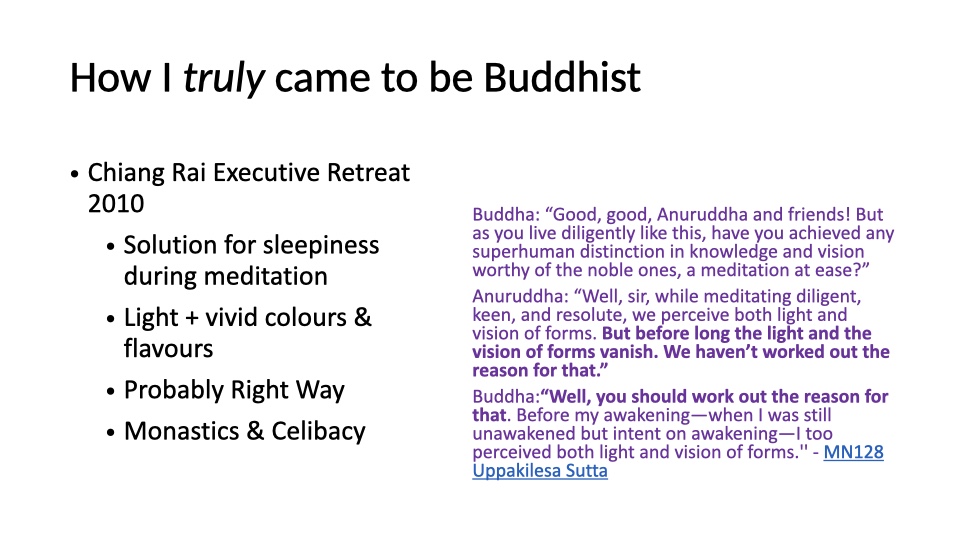
|
So how did I become TRULY a Buddhist? A big turning point was attending the Buddhist Fellowship’s Chiang Rai Executive Retreat in 2010, with Ajahn Brahm teaching the retreat. On the way there, I passed a Chang Beer advertisement, but had already signed a very long legalistic form agreeing to keep to the Five Precepts. I had just started a new stressful job, and I really could have used a beer! But I didn’t take a beer when I arrived at the hotel. It was my first time on retreat with Ajahn, and I was mentally prepared for a disciplined, rigorous retreat, even though I was extremely tired. To my huge surprise, Ajahn advised everyone to just sleep as much as possible, to catch up on rest. And to be unconditionally kind to your body & mind. It helped that the BF organized a group discount for spa treatments at the hotel, which I used! So I slept daily for about 14 hours… Ajahn also advised people to make peace, be kind, be gentle, and I decided to follow his instructions. Very quickly, in a few days’, the mind settled and the quality of the peace when I was watching my breath was much more calm & peaceful than any of my previous meditation retreats or experiences. One day, in the meditation hall, as I sat calmly watching my breath go in and out, I suddenly perceived this light. I initially thought someone had turned on the Dhamma hall’s light, but when my eyes opened, the hall was still dark. That evening, I asked a question: I think I got the nimitta (the light in the mind), so what do I do now? Ajahn answered: Just do what got you there. Do nothing. So I carried on just letting the mind be. And over the next few days, the nimitta got brighter & brighter, until I thought I was staring into the noon sun! At the same time that this happened, I naturally needed a lot less sleep (4 hours), and my mind was so energized that everything looked super vivid. The food (mango sticky rice, which was all that I ate) also tasted amazing. Then one day in the retreat, I was meditating in the hall, and watching my breath. Very quickly the nimitta came up, and I was blissing out watching it. Suddenly, it felt like someone had turned a dimmer switch down on the nimitta, and it was followed by this sensation that I was falling into an infinite hole inside myself…. that was then followed by this bliss, which can only be described as the bliss of all the orgasms I experienced in my life, compressed into one moment, and multiplied by a million times. I was so excited that my mind formed the thought “What the…” and I came out of the meditation experience panting. And I had two immediate thoughts: This was probably the Right Way, because it had been 8 days of keeping precepts, unconditional kindness & wholesome behaviour. No strain, no willpower. That’s why monks don’t need sex: they have a pleasure which is SO MUCH SUPERIOR to sex! The Buddha talked about this as well, in this sutta. MN 128: https://suttacentral.net/mn128/en/sujato # |
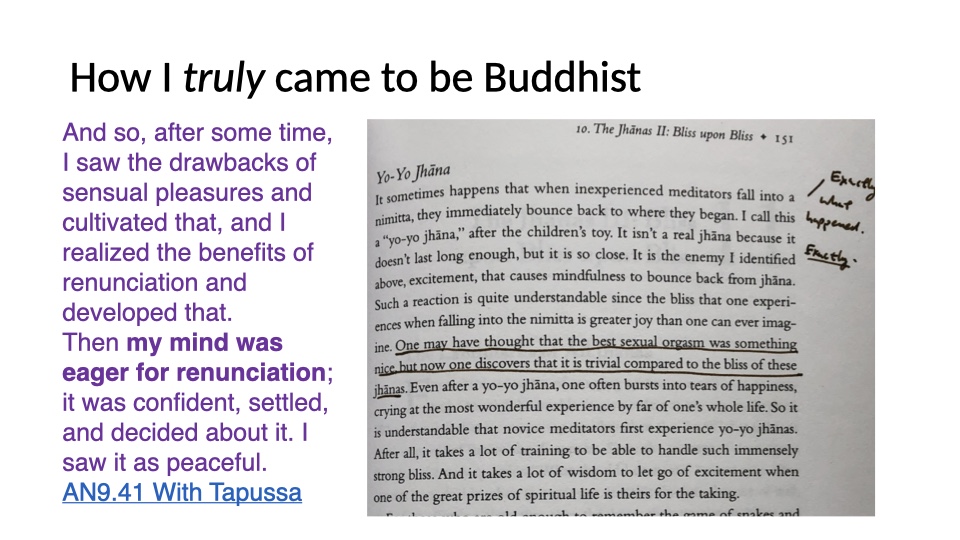
|
The other thing is that, when your mind directly experiences the pleasure of renunciation, the mind then leaps towards it very naturally. This is my copy of “Happiness through Meditation”, and my original note which I wrote after I encountered the yoyo jhana experience. I was so excited to read this description, which so accurately described what I experienced, that I underlined & wrote “Exactly what happened. Exactly.” Ajahn also gave very good advice in the Q&A, saying to me “don’t want the jhanas. Want the causes, not the experience.” I can tell you from experience that it is VERY hard to not want the experience again! Even now, when I meditate, when I get close, there’s this excitement. AN 9.41 - https://suttacentral.net/an9.41/en/sujato # |

|
In most people's minds, the idea of the Middle Way means you're not too lazy and you're not overly ascetic. I think most people do not realise the extent that they are control freaks needing to keep control, and thus my guess is that 99% of Buddhists have never experienced the real joy of renunciation, because they are still keeping very subtle control. You hear this from the language people use to talk about their practice: about how they are "not very disciplined", "need more discipline", "lazy", etc.it: it is all paper play before that. This is reflected in the language used by members of the Dharma community. If you ask people why they don’t meditate, what’s the most common reason they say they won’t meditate? I will tell you what: they will say they are “not disciplined enough”. The word “discipline” means there is some willpower involved, about grasping. But this path that the Buddha taught, is about the other way: it’s about renunciation, letting go, not grasping. And people don’t really know how to let go. I often get asked “how do you get so disciplined to meditate daily?” For me, asking me to not meditate is like asking me not to go for a mental spa treatment which I get to enjoy daily! It’s about the pleasure of renunciation which I enjoy, which is a very big difference. This sutta from the Dantabhumi sutta explains this quite wonderfully. One person goes up a mountain, and comes down to tell his friend about all the sights he saw from the peak, and the friend’s response is “that’s not possible!” MN 125 https://suttacentral.net/mn125/en/sujato # |
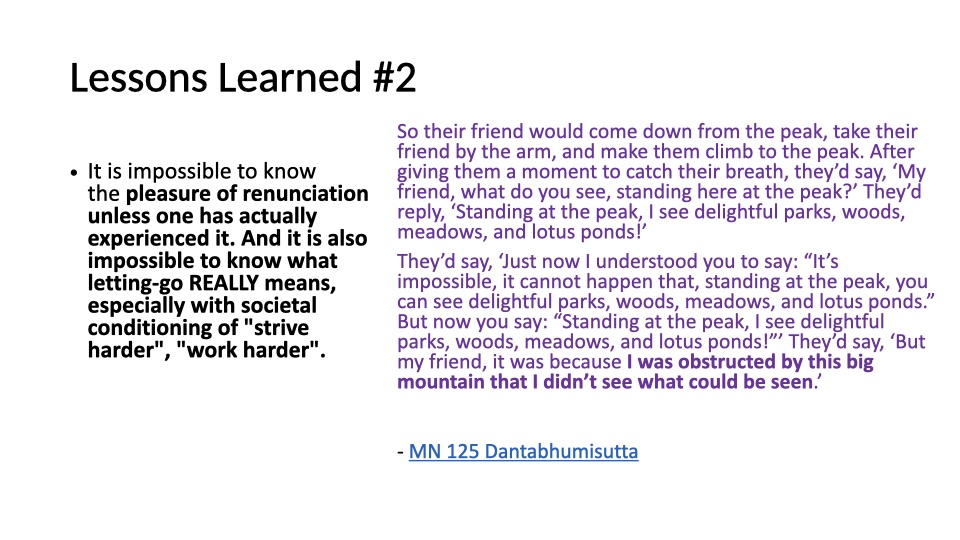
|
Then the first friend brings the second friend up the mountain, and the second friend then sees the delightful parks, woods, meadows etc. that are visible from the peak. And the reason is that the second friend was obstructed by a big mountain. MN 125 https://suttacentral.net/mn125/en/sujato # |

|
The mass of ignorance & delusion from conditioning by the five-sense world prevents people from understanding the pleasures of renunciation. And for Singaporean society, the conditioning of “you must work harder” is also a barrier. And that is an obstruction preventing you from really experiencing the pleasures of renunciation. MN 125 https://suttacentral.net/mn125/en/sujato # |

|
The other observation I have is that, frequently in the community, people talk about the need to be equanimous, that one shouldn’t be attached to pleasures. But reading the suttas, it is clear that there ARE certain pleasures which one SHOULD cultivate. What should NOT be cultivated are the sensual pleasures. MN 139: https://suttacentral.net/mn139/en/sujato # |
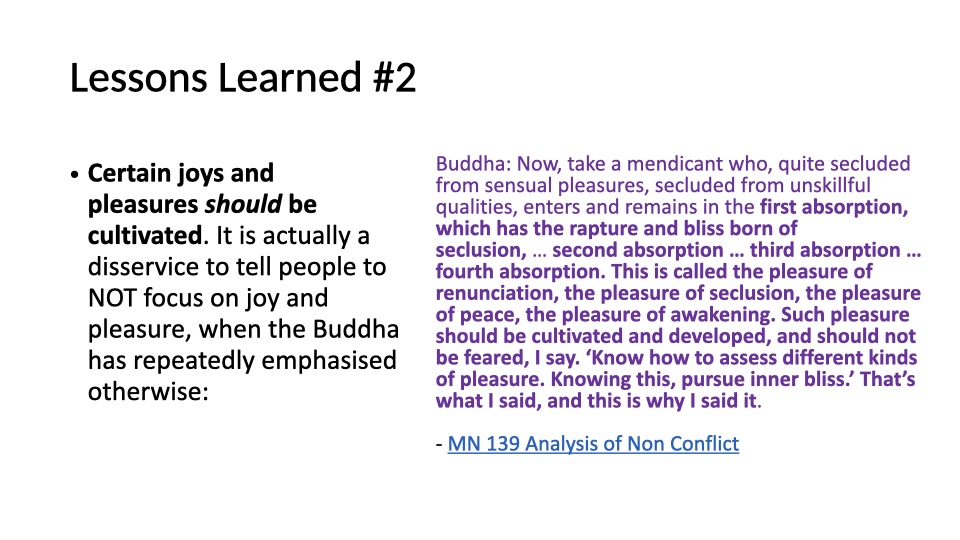
|
… but the pleasures of samadhi, of the first, second, third and fourth jhanas, SHOULD be cultivated, and should NOT be feared. This is especially since the jhanas are quite often repeated in the Pali and the Chinese. So this is something you SHOULD cultivate as far as possible. Even if you haven’t fully experienced the four Jhanas, the pleasure of working towards these four jhanas through renunciation should be cultivated. MN 139: https://suttacentral.net/mn139/en/sujato # |
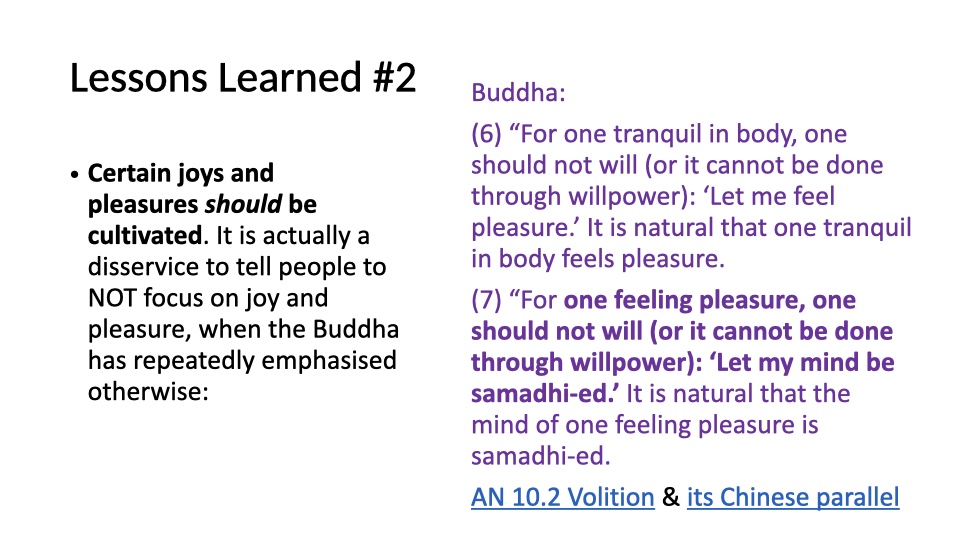
|
The other thing to note is that, in certain texts, the Buddha emphasizes that you CANNOT achieve samadhi through willpower. Imagine that you’re in a pool of water, and that your thoughts are ripples on the surface of the pool. Using willpower to remove your thoughts is like using your hand to smoothen ripples on the surface of the water: the more you try, the more your hand disturbs the water, and the larger the waves become. Some people have tsunamis as a result! So you can really only let go. AN 10.2: https://suttacentral.net/an10.2/en/bodhi Chinese parallel MA 43 (Traditional Chinese): https://suttacentral.net/ma43/lzh/taisho # |

|
The direction of the Eightfold Path is inwards, and that means you have to remove the physical discomfort and focus. # |

|
The other thing that people don’t realise is that there is a Wrong Eightfold Path: everything in the Eightfold Path has a “wrong” counterpart. The wrong counterpart to Right Intention, is Wrong intention through picking things up. You’re picking up views (“this is how a retreat should be”). Wrong intention is also with ill will. A hack I have is that, if the focus is solely & easily located within the five senses, then it is probably the Wrong Eightfold PAth. # |

|
So after the end of the Chiang Rai retreat, I was flying off, and I passed another Chang Beer advertisement. But this time, I had zero interest nor inclination to drink. And that prompted me to investigate why: I realised I was conditioned. And I gave up drinking alcohol after that. On the flight back, I was seated next to Ajahn Brahm, thanks to Angie, and I asked Ajahn for advice on how to practice. Ajahn advised me to read the suttas, since there are very good translations, but to accompany that with his talks on the suttas. At that time, I had thought “of course you would say your talks are the best! Everyone says that of their own talks!” but I now realise that Ajahn was speaking out of compassion, as he was one of the first to introduce the comparative analysis of the Pali Canon with its Chinese parallels in his sutta studies. This only happened in the last 10-15 years. He also draws a lot on his in depth understanding of the Pali Vinaya, which is a form of Pali that is more every-day than the Sutta Pali, and which gives him a very different perspective from most people. The other advice Ajahn gave was to focus on giving more, serving more: he observed that “young men tend to be self-centered” and serving more would be good for me. That was actually very good advice! # |
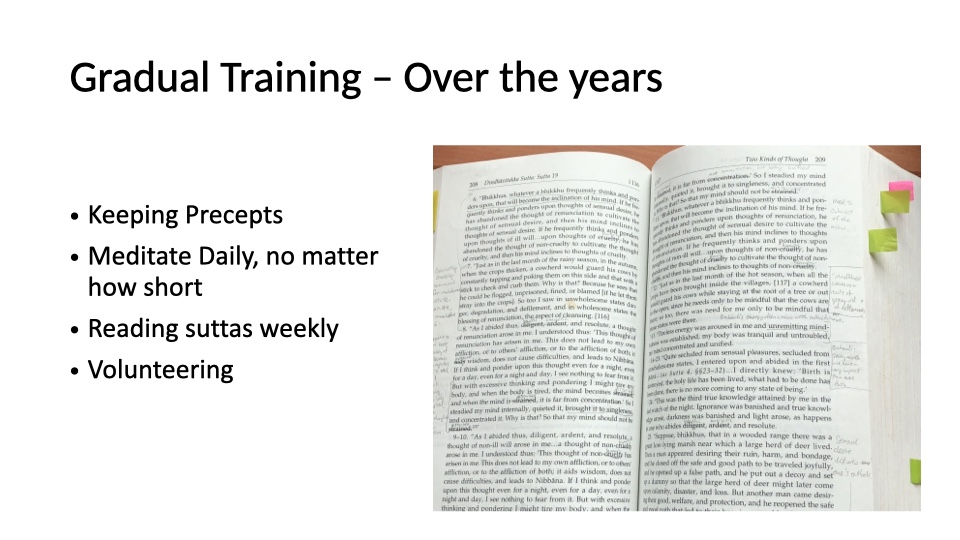
|
So when I was posted in India from 2012-2015, what I did was to keep the Five Precepts. I also started a daily habit of meditation, to sit and meditate no matter how short. And on the weekends, I would start downloading sutta talks by Ajahn Brahm, Ajahn Brahmali and Ajahn Sujato on Saturday evenings, and spend Sunday afternoons reading the respective suttas while listening to the talks, and taking notes. The picture is of my personal copy of the Majjhima Nikaya, with the notes taken in pencil as I listened to the sutta classes. I also started volunteering regularly with my wife on the weekends, at a school teaching English, and later at a slum shelter teaching people basic computer skills. # |

|
The other thing that happened was we had cats. This is Dharma (dark calico) and Greg (white light brown). Greg is very sweet natured, and we had no problems from her. We were very biased towards her. Dharma, however, was extremely bad tempered at the start. You can see the scars on my hands: that happened when we tried to feed Dharma her medication without wrapping her in a towel. Both my wife and I had very bloodied hands, as her claws came out and she scratched like mad! It got worse and worse, and we consulted the internet: spraying water on her face to “discipline her”, scaring her with a rolled newspaper, etc. It didn’t work, and just got even worse. Then we went to attend our annual retreat. Ajahn shared a powerful story about the power of loving kindness (metta). The long story short was that , the prisoners he was teaching told him that loving kindness would work outside a prison, but not in a prison. He asked who was the hardest person in the prison (it was a senior warden, who apparently didn’t even treat the prisoners like they existed), and who had the most exposure with this warden (a prisoner served him tea daily). So Ajahn coached this prisoner to give as much loving kindness to the warden as possible, through the mind, speech & bodily actions. Week after week, Ajahn came in, and the prisoner kept reporting to him “I tried, it’s not working”, and Ajahn kept encouraging the prisoner to carry on. One day, the prisoner came running to Ajahn, saying “Ajahn! I served him tea one day, and he grunted in acknowledgement!” That made waves in the WA prison system. Ajahn encouraged the prisoner to carry on, as “the dam is breaking!” Then one day, apparently the prisoner served the warden his usual tea, with cookies etc., and the warden turned to him, looked him in the eye, and said “Thank you.” —- That left a deep impact on my wife and I. After the retreat, both of us spontaneously and separately had the thought that, “Maybe we are too hard on Dharma” and so we changed our attitude towards her completely. We threw away the spray bottle and put aside the newspaper rolls. When she bit us, we just tolerated it, and just continued stroking her in her sweet spot, giving her loving kindness nonstop. # |
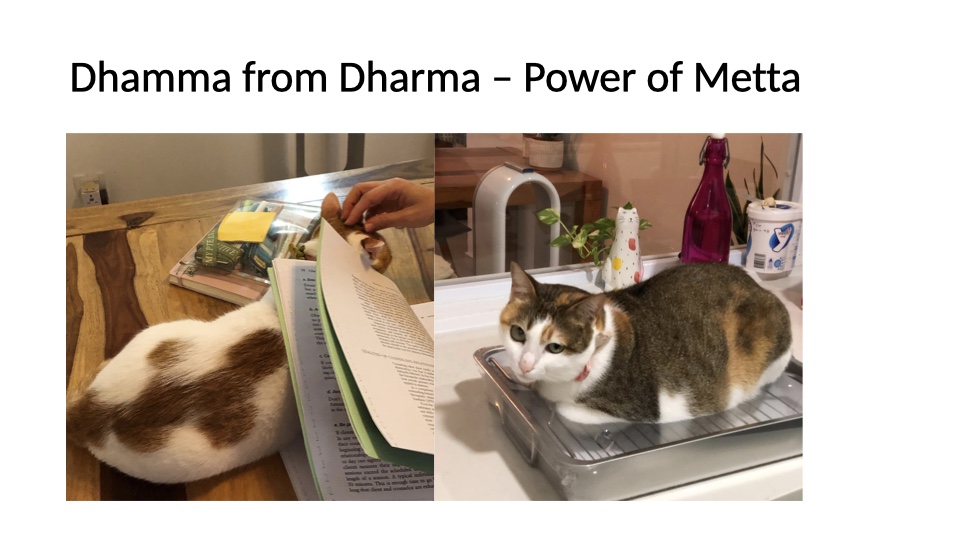
|
A few months of this nonstop loving kindness, and we had a completely different cat. This showed itself in the visits to the vet for her vaccinations: initially she was so defensive that the vets’ attendants had to hold her tight and press her hard against the table, as her claws would immediately come out! After our loving kindness, we brought her back for her shots, and she had no claws out when the injection went in: she just went “Eck!” (she doesn’t meow but quacks), with NO CLAWS at all. As a result of us giving her (and Greg) non-stop loving kindness, we now have two very fat cats, shown here. # |

|
This episode with Dharma made me realise that it all started with how we perceived her. We perceived her with a fault finding mind, and that shaped the subsequent interactions, with her subsequently showing me what I saw in her. That made me realise that it was very important to be careful how I perceived others.That was something I brought to work: how was I seeing people? Was I focusing on their strengths or weaknesses? If I went to fault find, that tended to demoralize people, which caused them to perform worse, which made me fault find even more, and it was just a vicious cycle all the way down… But if I instead focused on their strengths, that gave them confidence, like watering a plant rather than weeds, and caused a VIRTUOUS cycle instead. And by focusing on strengths, I could also more easily figure out how they could complement me. So that 2+2 > 4 And this is what the Buddha also taught in this text, called the Two Kinds of Thought. MN 19: https://suttacentral.net/mn19/en/bodhi # |

|
The other thing to share is about livelihood. WHen choosing a job, the most important thing is to choose a job that has the environment and conditions to support your SPIRITUAL GROWTH. It’s really NOT about money, power, change or impact: when you are dying ,honestly you won’t be thinking so much about “oh if only I worked harder”: in fact, a palliative care nurse shared that the 3rd most common lament from the dying she heard, was “I wished I hadn’t worked so hard”! MN 17: https://suttacentral.net/mn17/en/sujato # |
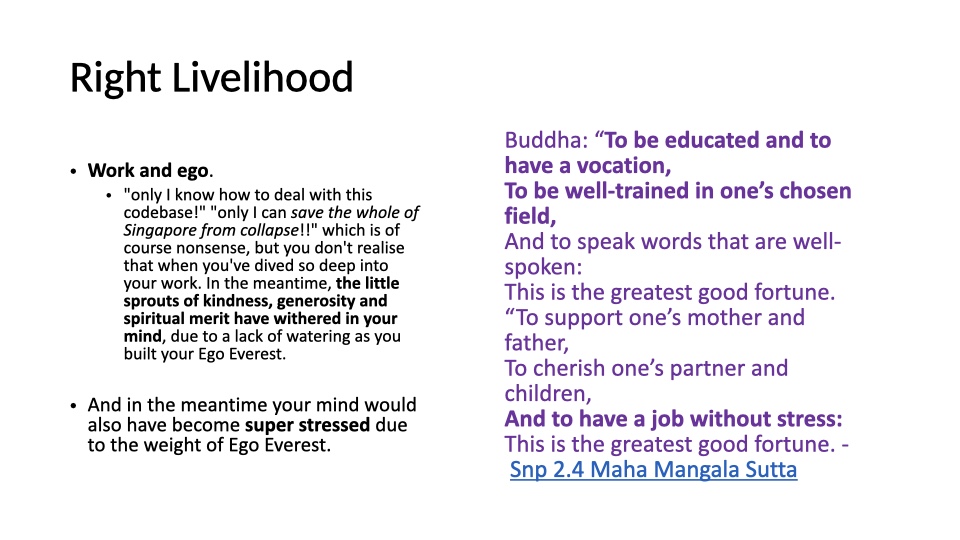
|
The other thing to note about choosing a job, is to note the stress level. If the stress level is too high, that can cause you to neglect your spiritual qualities in order to focus on your work and ego. And your work and your ego become very intertwined. In time, your mind will become crushed by an ego the size of Mount Everest! And like the Mangala sutta says, to have a job without stress is the greatest good fortune. Snp 2.4 : https://suttacentral.net/snp2.4/en/brahmali # |

|
I’ll talk very briefly about my own regular practice. In 2019 I was sent by the EDB to study interaction design in Copenhagen. So I kept precepts, and meditated daily 30 mins. I also chanted the Metta sutta, which helped with Copenhagen peak hour bike traffic! And on the weekends, I would take a walk through the cemetery near my home, and look at the names and birthdates of people who had died. It was especially a good reminder when I came across people who died very close to my age, like this tombstone. # |

|
Nowadays, my daily practice is the same things, of keeping precepts and meditating daily with my wife. But I also take steps to protect my mind through three things: I don’t read the news daily at all. Most news is very tragic and sad. At the same time, how does the sad news help with your spiritual journey and pathway? Going back to the sutta MN 19, “Whatever your mind frequents, that is what your mind inclines towards.” if you keep inclining your mind towards the never ending barrage of bad news coming from the world, towards all the negativity of people killing each other, cheating each other, that is what your mind will incline towards. I also limit my exposure to social media to a few mins a day. The last one is that my phone is perpetually on Do Not Disturb. This depends a lot on your individual job requirements; I’m lucky that I don’t have to work in a job that requires me to be always on. I also turn off notifications. And on a weekly basis, I read the suttas and try to share one on social media weekly. # |

|
So what now? my aspiration is to work towards stream entry, even an anagami, a non returner. Many of the most inspiring lay persons in the suttas are non-returners, like Ghatikara the potter who doesn’t calculate his own self interest. Or Ugga the Householder, who teaches the Dhamma if the monastics don’t teach him the Dhamma. MN 81: https://suttacentral.net/mn81/en/sujato AN 8.21: https://suttacentral.net/an8.21/en/sujato # |

|
Or Citta the Householder, who could get into the jhanas whenever he wanted to. SN 41.8: https://suttacentral.net/sn41.8/en/sujato # |
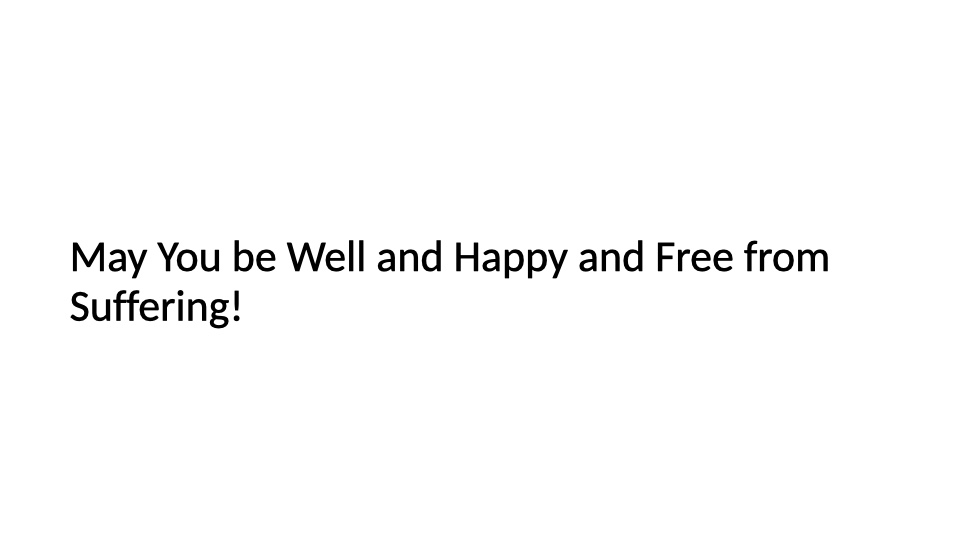
|
So that is the end of my talk, and I wish everyone here wellness and happiness, and freedom from suffering! # |
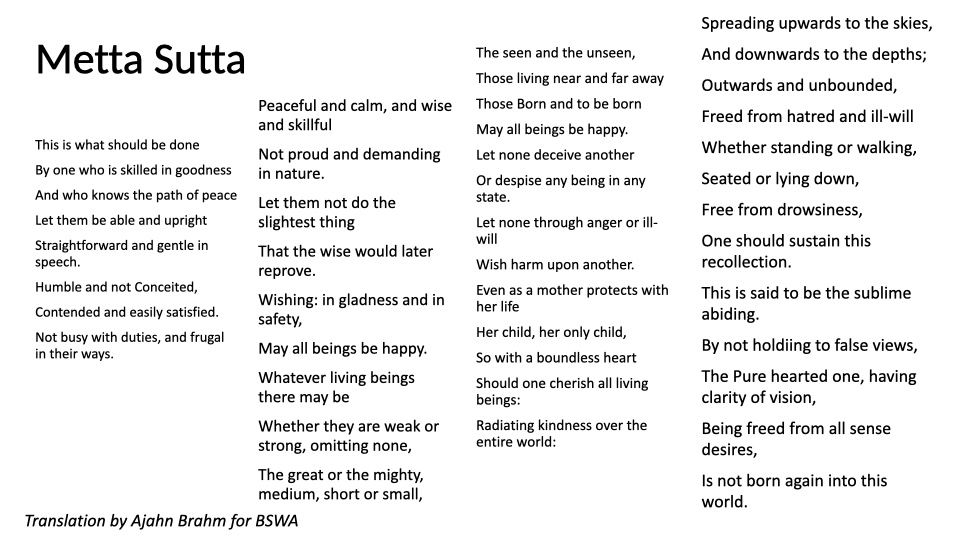
|
# |